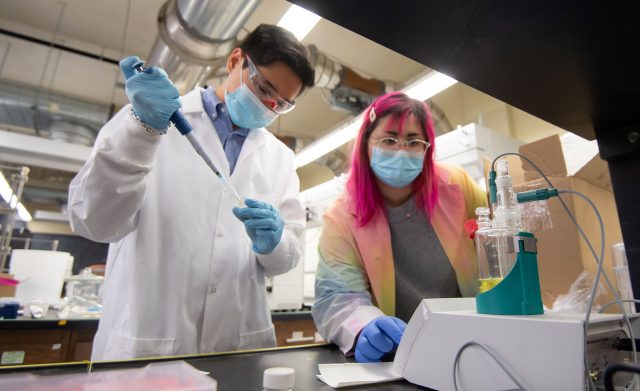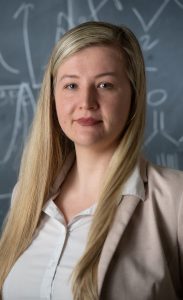
UM students conduct research on ionic liquids in Eden Tanner’s lab in Coulter Hall. Tanner has received an $850,000 CAREER Award from the National Science Foundation to fund the work, which could lead to targeted drug delivery systems. Photo by Kevin Bain/Ole Miss Digital Imaging Services
The National Science Foundation has awarded Eden Tanner, an assistant professor of chemistry and biochemistry at the University of Mississippi, an $850,000 CAREER award to further her study of salts called ionic liquids and how a coating of them enables selective hitchhiking on blood components.
Tanner’s five-year project, “Elucidating the Mechanism of Ionic Liquid-Coated Nanoparticle Interactions with Blood Components,” could lead to the development of targeted drug delivery systems that are safer and more effective for patients.
CAREER awards support early-career faculty who have both the potential to serve as academic role models in research and education, as well as to lead advances in the mission of their department or organization.
“This prestigious CAREER award highlights the quality of our younger faculty in the chemistry department as well as the exciting research programs in their labs,” said Greg Tschumper, professor and chair of the Department of Chemistry and Biochemistry. “We are very proud of Dr. Tanner for this significant accomplishment and fortunate to have her as a faculty member in the department.”
This is the eighth time the NSF has awarded an Ole Miss chemistry faculty member a CAREER award over the past dozen years.
The Tanner Lab works with nanoparticles, which are considered a strong possibility for ideal drug delivery systems due to their ability to deliver drugs effectively, safely and specifically. It also focuses on solving specific biomedical and bioengineering challenges.
Tanner uses a rigorous systematic investigatory style of physical chemistry to understand how materials interact with the human body. Ionic liquids are types of salt, but they are “bulky,” she said.
“They don’t form solids at room temperature, unlike typical salts like, for example, sodium and chloride, that fit cleanly together and make a crystal lattice,” she explained. “The materials that we’re working with don’t do that. So that frustration, that almost forbidden love story between the cations – the positively charged part – and the anion – the negatively charged part – is what makes them liquid at room temperature.
“We are kind of manipulating basic chemistry to really impact applications for human health.”
Tanner’s team must construct ionic liquids in the lab because they are rare in nature. Researchers know of only one example.
“Two warring species of fire ants are involved, where one of the ants makes an ionic liquid out of the venom of the other ants to neutralize it,” Tanner said. “They basically are taking over the Southwestern region of the United States because of their ability to make ionic liquids out of their competitors’ venom.
“Broadly speaking, that is the only natural example of ionic liquids ‘in the wild,’ although I will say all the things that we mix to make ionic liquids are generally found either in the human body, in foodstuffs or other very safe kinds of materials.”
Tanner’s focus involves creating safe materials and eliminating many problems with side effects and toxicity.
“The chemicals are naturally derived,” she said. “What that means is that if you put them into the human body, the human body recognizes those molecules as being part of the natural environment that it’s used to and not foreign.”
The ionic liquids research includes collaboration with scholars from Louisiana State University, University of Minnesota, Mississippi State University and Stanford University. The award also will fund travel for Tanner’s team to the University of Michigan for further research.
The native Australian joined the Ole Miss faculty three years ago after earning her doctorate at the University of Oxford in England and completing her postdoctoral training at Harvard University.
In 2022, Tanner was the sole recipient of the Pharmaceutical Research and Manufacturers of America’s annual $100,000 Research Starter Grant in Drug Delivery, which supports tenure-track faculty who are in the earliest stages of their research career.
The NSF encourages women, members of underrepresented minority groups and persons with disabilities to apply for the CAREER award. Tanner extends the NSF expectations by staffing her lab to reflect those goals of enhancing diversity in STEM education.
More than 70% of her team are women or nonbinary people, and 45% of them are people of color. They also reflect the interdisciplinary nature of her research approach.
“I have graduate students who have backgrounds in chemical engineering, bioengineering, molecular biology, physics, and of course, they are all here earning a Ph.D. in chemistry,” she said. “They have an interest in chemistry, but their backgrounds are really diverse.
“Engineers and scientists think about problems – the same problem – from different perspectives, and physicists do, too. I find having multiple perspectives in the room really strengthens the kind of questions we can ask, the experiments we are able to design and the ideas that are coming in.”
This material is based upon work supported by the National Science Foundation under Grant No. 2236629.
